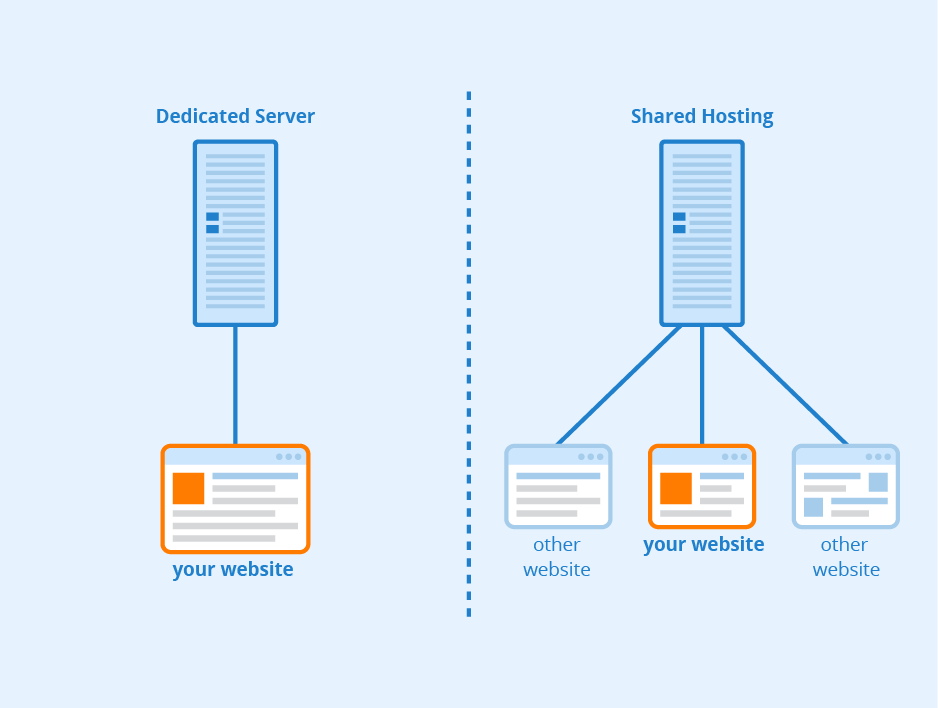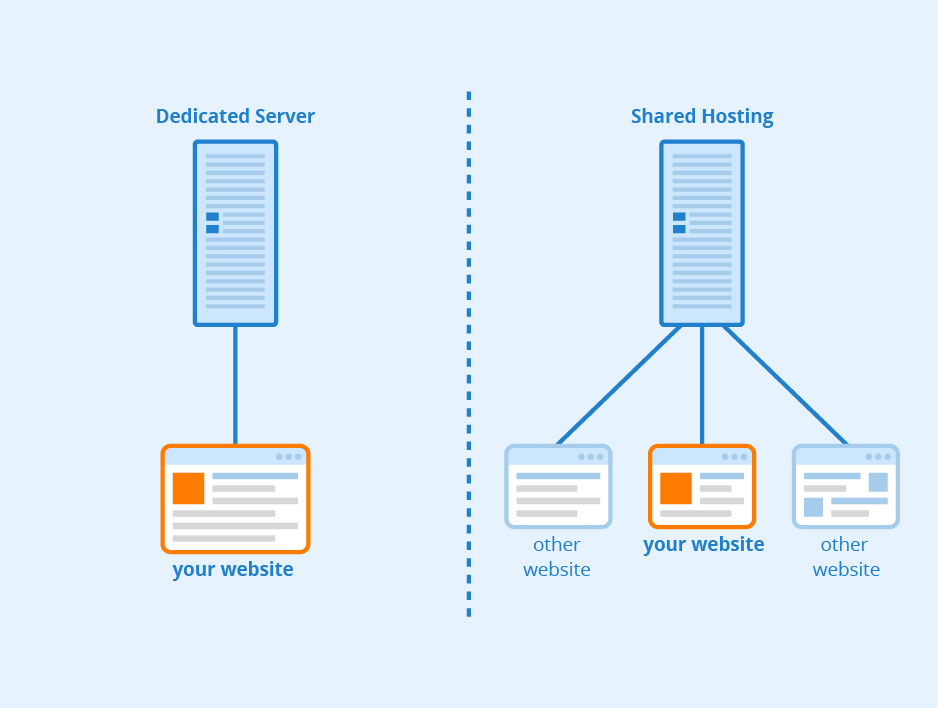VPS hosting provides dedicated resources and flexibility, making it ideal for businesses with high traffic websites or complex applications. Shared hosting, on the other hand, involves sharing resources with other websites, making it a more affordable choice for small businesses or personal websites. With VPS, you have full control and customization options, while shared hosting offers simplicity and ease of use. Consider your website’s needs and budget when choosing between VPS and shared hosting.
When it comes to hosting your website, understanding the difference between VPS and shared hosting can make a significant impact on the performance and scalability of your site. Shared hosting may seem like a cost-effective option, but did you know that it means you’re sharing server resources with other websites? This can lead to slower load times and limited control over the server environment.
On the other hand, VPS hosting provides a more powerful and customizable option. With VPS, you have your own virtual server that operates independently from other websites. This not only gives you faster performance but also greater control over resources, allowing you to customize your server settings based on your specific needs. Whether you’re running a small business website or a resource-intensive application, VPS hosting can provide the scalability and flexibility required to ensure optimal performance.

Understanding VPS and Shared Hosting
When it comes to hosting a website, two of the most popular options are virtual private servers (VPS) and shared hosting. Each of these hosting solutions has its own advantages and disadvantages, making it essential for website owners to understand the key differences between them. With VPS hosting, the server is divided into virtual compartments, where each website has its own dedicated resources and operating system. On the other hand, shared hosting involves multiple websites sharing the same server and its resources. Let’s explore the differences between VPS and shared hosting in more detail.
One of the main benefits of VPS hosting is the enhanced level of control it provides to website owners. With a VPS, you have root access and the ability to customize the server environment to suit your specific needs. This level of control is particularly advantageous for businesses or individuals with specific software requirements or security considerations. Additionally, the dedicated resources of a VPS ensure that your website’s performance is not affected by other websites sharing the same server.
Shared hosting, on the other hand, is a more cost-effective option and is suitable for smaller websites or those with lower traffic volumes. Since multiple websites are hosted on the same server, the cost is divided among the users, making it an affordable choice. Shared hosting also relieves website owners from the technical aspects of server management, as the hosting provider takes care of maintenance and updates. However, the shared nature of the server means that if one website experiences high traffic or uses excessive resources, it can negatively impact the performance of other websites on the same server.
Considering these differences, website owners should carefully assess their specific needs and requirements before choosing between VPS and shared hosting. If you value control, customization, and dedicated resources, VPS hosting may be the ideal choice. On the other hand, if cost-effectiveness and simplicity are more important to you, shared hosting can be a viable option. Now that we have a basic understanding of the differences between VPS and shared hosting, let’s dive deeper into the specific features and benefits of each.
VPS Hosting: Customization and Control
VPS hosting stands out for its high level of customization and control. Here are some key features and benefits of VPS hosting:
1. Dedicated Resources
With VPS hosting, your website has dedicated resources such as a specific amount of RAM, CPU, and storage capacity. This ensures that your website’s performance is not affected by the activities of other websites sharing the same server. You have complete control over these resources and can allocate them as needed to optimize your website’s performance.
Having dedicated resources also means that your website can handle higher levels of traffic without experiencing slowdowns or crashes. This is particularly important for businesses or individuals running resource-intensive applications or websites that experience spikes in traffic.
Additionally, with VPS hosting, you have the freedom to install and run custom software or applications that are not typically supported in shared hosting environments. This provides a higher level of flexibility and customization to meet your unique needs.
In summary, dedicated resources allow for better website performance, scalability, and the ability to handle higher traffic volumes.
2. Root Access and Customization
An important advantage of VPS hosting is the ability to have root access to the server. Root access gives you complete control over the server environment, allowing you to customize settings, install applications, and make configurations according to your specific requirements.
This level of control is particularly beneficial for businesses or individuals with specialized software needs or specific security requirements. You have the freedom to install and manage security software, set up firewalls, and implement other measures to protect your website and data.
In addition, root access enables you to troubleshoot issues or make system-level changes without relying on technical support. This level of control and customization allows you to create a hosting environment tailored to your exact specifications.
In summary, root access and customization options provide a high level of control and flexibility, allowing you to optimize your server environment and implement security measures according to your specific needs.
Shared Hosting: Affordability and Simplicity
Shared hosting is a popular choice due to its affordability and simplicity. Here are some key features and benefits of shared hosting:
1. Cost-effectiveness
Shared hosting is typically the most cost-effective option, making it an ideal choice for small businesses, individuals, or websites with lower traffic volumes. The cost of the server is divided among the users, making it significantly cheaper compared to VPS or dedicated hosting.
This affordability makes shared hosting appealing to startups or individuals with budget constraints. It allows them to get their website up and running without a significant financial investment.
However, it’s important to note that shared hosting plans may have limitations on resources such as disk space, bandwidth, or CPU usage. It’s essential to carefully review the plan’s specifications and ensure they meet your website’s requirements.
2. Easy Setup and Maintenance
Shared hosting is known for its simplicity and ease of use. The hosting provider takes care of server management, software updates, and security patches, allowing website owners to focus on their core business or website content.
The hosting provider ensures that the server is properly configured and optimized for the shared hosting environment, eliminating the need for website owners to have technical expertise or experience in managing servers.
This ease of setup and maintenance makes shared hosting a suitable option for beginners or those with limited technical knowledge.
In summary, shared hosting offers an affordable and user-friendly hosting solution, making it an attractive choice for individuals or small businesses with limited budgets or technical expertise.
Conclusion
Choosing between VPS and shared hosting ultimately depends on your specific needs, budget, and technical requirements. VPS hosting provides a higher level of control, customization, and dedicated resources but comes at a higher cost. On the other hand, shared hosting offers affordability and simplicity but may have limitations in terms of customization and performance.
Consider factors such as website traffic, resource requirements, scalability, and security needs when making your decision. It’s also beneficial to consult with hosting experts or providers to get personalized recommendations based on your specific situation.
Ultimately, both VPS hosting and shared hosting have their own merits, and the choice depends on what best aligns with your website’s goals and requirements.
To learn more about choosing the right hosting for your website, visit example.comKey Takeaways
- VPS hosting: Provides dedicated resources for each user, offering better performance and scalability.
- Shared hosting: Shares resources among multiple users, making it a more affordable option.
- VPS hosting: Offers more control and customization options compared to shared hosting.
- Shared hosting: Suitable for small websites and beginners with limited technical knowledge.
- VPS hosting: Generally more expensive than shared hosting but provides better reliability and security.
Shared hosting is like sharing a house with roommates, where you all share the same resources. It’s affordable and easy to set up, but you have limited control and scalability.
On the other hand, VPS hosting is like having your own apartment in a building. You have dedicated resources, more control over your environment, and better scalability. It’s more expensive but offers better performance and flexibility.

